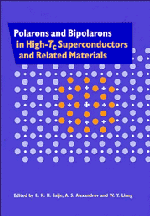Book contents
- Frontmatter
- Contents
- Preface
- 1 A polaron theory of high-temperature superconductors
- 2 On the possibility of non-BCS superconductivity
- 3 A bipolaron Bose liquid in high-Tc superconductors
- 4 Spin polarons in high-Tc superconductors
- 5 The polaron scenario for high-Tc superconductors
- 6 Formation, phase separation and superconductivity of large bipolarons
- 7 Polarons and bipolarons in WO3−x and YBa2Cu3O7
- 8 Polaron bands in the far- and mid-infrared spectra of e-doped cuprates
- 9 Electron–phonon interaction of non-equilibrium carriers in the photoinduced state of YBa2Cu3O7−δ
- 10 Experimental evidence of local lattice distortion in superconducting oxides
- 11 The Hall effect due to small polarons and conduction in narrow energy bands
- 12 Static and dynamic conductivity of untwinned Y1Ba2Cu4O8: gaps or condensation?
- 13 The near infrared and optical absorption of high- Tc superconductors using powders
- 14 Polaronic theory of mid-infrared conductivity: a numerical cluster study
- 15 Electromagnetic properties of local pair superconductors
- 16 Electron–hole asymmetric polarons
- 17 On the nature of the superconducting state in high-Tc cuprates
- 18 High- Tc superconductivity with polarons and bipolarons: an approach from the insulating states
- 19 Coexistence of small-polaron and Anderson localization in high- Tc superconducting materials
- 20 Concentration and temperature-dependence of magnetic polaron spectra in the t–J model
- 21 Mass enhancement without band-narrowing in t–t′–J and related models: predictions for Fermi-surface and optical conductivity
- 22 Polarons in Peierls–Hubbard models
- 23 Exact estimates of inter-polaron coupling constants resulting in bipolaron formation
- 24 Coulomb interaction and the criteria for bipolaron formation
- 25 Large bipolarons and high-Tc materials
- 26 Collective excitations in the ground state of a two-dimensional attractive Fermi gas
- 27 Strong two-band electron self-trapping, state hybridization effects and related pressure-induced phenomena in semiconductors
- 28 Bismuth disproportionation in super- and semiconducting barium bismuthates
- 29 Magnetic polarons in concentrated and diluted magnetic semiconductors
- 30 Energy scales of exotic superconductors
- Index
15 - Electromagnetic properties of local pair superconductors
Published online by Cambridge University Press: 24 November 2009
- Frontmatter
- Contents
- Preface
- 1 A polaron theory of high-temperature superconductors
- 2 On the possibility of non-BCS superconductivity
- 3 A bipolaron Bose liquid in high-Tc superconductors
- 4 Spin polarons in high-Tc superconductors
- 5 The polaron scenario for high-Tc superconductors
- 6 Formation, phase separation and superconductivity of large bipolarons
- 7 Polarons and bipolarons in WO3−x and YBa2Cu3O7
- 8 Polaron bands in the far- and mid-infrared spectra of e-doped cuprates
- 9 Electron–phonon interaction of non-equilibrium carriers in the photoinduced state of YBa2Cu3O7−δ
- 10 Experimental evidence of local lattice distortion in superconducting oxides
- 11 The Hall effect due to small polarons and conduction in narrow energy bands
- 12 Static and dynamic conductivity of untwinned Y1Ba2Cu4O8: gaps or condensation?
- 13 The near infrared and optical absorption of high- Tc superconductors using powders
- 14 Polaronic theory of mid-infrared conductivity: a numerical cluster study
- 15 Electromagnetic properties of local pair superconductors
- 16 Electron–hole asymmetric polarons
- 17 On the nature of the superconducting state in high-Tc cuprates
- 18 High- Tc superconductivity with polarons and bipolarons: an approach from the insulating states
- 19 Coexistence of small-polaron and Anderson localization in high- Tc superconducting materials
- 20 Concentration and temperature-dependence of magnetic polaron spectra in the t–J model
- 21 Mass enhancement without band-narrowing in t–t′–J and related models: predictions for Fermi-surface and optical conductivity
- 22 Polarons in Peierls–Hubbard models
- 23 Exact estimates of inter-polaron coupling constants resulting in bipolaron formation
- 24 Coulomb interaction and the criteria for bipolaron formation
- 25 Large bipolarons and high-Tc materials
- 26 Collective excitations in the ground state of a two-dimensional attractive Fermi gas
- 27 Strong two-band electron self-trapping, state hybridization effects and related pressure-induced phenomena in semiconductors
- 28 Bismuth disproportionation in super- and semiconducting barium bismuthates
- 29 Magnetic polarons in concentrated and diluted magnetic semiconductors
- 30 Energy scales of exotic superconductors
- Index
Summary
Abstract
Recent experimental findings concerning the temperature-dependence of the penetration depth and strong empirical evidence for a universal 3D X–Y critical behaviour in several classes of high- Tc superconductors suggest that Bose condensation of ‘weakly charged’ bosons can be a driving mechanism for the phase transition in extreme type II superconductors. We explore the occurence of analogous behaviour in a simple model of local electron pairs, which is that of hard-core charged bosons on a lattice. We examine the electromagnetic properties of the model in the superfiuid phase as a function of boson concentration and density–density interaction. In the low-density limit, with the use of the exact scattering length, we present new results for the ground state characteristics. The relevance of the obtained results to interpretation of experimental data on high-Tc oxides is discussed.
Introduction
Some recent experimental results concerning temperature-dependence of the London penetration depth and empirical evidence for a universal 3D X–Y critical behaviour in several families of high- Tc superconductors indicate that Bose condensation can be a driving mechanism for the phase transition in these extreme type II superconductors [1–3]. Motivated by these experimentally established universal trends, we examine the electromagnetic properties of the effective pseudo-spin model of the local pair superconductor, equivalent to a hard-core charged Bose gas on a lattice, for the case of arbitrary electron concentration n. From linear response theory, the current response is obtained and expressions for the paramagnetic and diamagnetic kernels are evaluated in the RPA (random phase approximation) and SWA (spin-wave approximation).
- Type
- Chapter
- Information
- Publisher: Cambridge University PressPrint publication year: 1995



